- Clone
- UCHL1 (See other available formats)
- Regulatory Status
- RUO
- Workshop
- IV N31
- Other Names
- CD45RO
- Isotype
- Mouse IgG2a, κ
- Barcode Sequence
- CTCCGAATCATGTTG
- Ave. Rating
- Submit a Review
- Product Citations
- publications
| Cat # | Size | Price | Quantity Check Availability | Save | ||
|---|---|---|---|---|---|---|
| 304265 | 10 µg | 296€ | ||||
CD45RO is a 180 kD single chain membrane glycoprotein. It is a splice variant of tyrosine phosphatase CD45, lacking the A, B, and C determinants. The CD45RO isoform is expressed on activated and memory T cells, some B cell subsets, activated monocytes/macrophages, and granulocytes. CD45RO enhances both T cell receptor and B cell receptor signaling mediated activation. CD45 and its isoforms non-covalently associate with lymphocyte phosphatase-associated phosphoprotein (LPAP) on T and B lymphocytes. CD45 has been reported to be associated with several other cell surface antigens including CD1, CD2, CD3, and CD4. CD45 has also been reported to bind galectin-1 and CD22. CD45 isoform expression can change in response to cytokines.
Product DetailsProduct Details
- Verified Reactivity
- Human
- Reported Reactivity
- Chimpanzee, Cynomolgus, Common Marmoset
- Antibody Type
- Monoclonal
- Host Species
- Mouse
- Immunogen
- IL-2 dependent T cell line, CA1
- Formulation
- Phosphate-buffered solution, pH 7.2, containing 0.09% sodium azide and EDTA
- Preparation
- The antibody was purified by chromatography and conjugated with TotalSeq™-D oligomer under optimal conditions.
- Concentration
- 0.5 mg/mL
- Storage & Handling
- The antibody solution should be stored undiluted between 2°C and 8°C. Do not freeze.
- Application
-
PG - Quality tested
- Recommended Usage
-
Each lot of this antibody is quality control tested by immunofluorescent staining with flow cytometric analysis and the oligomer sequence is confirmed by sequencing. TotalSeq™-D antibodies are compatible with Mission Bio’s Tapestri Single-Cell Sequencing Platform for simultaneous detection of DNA and Protein.
To maximize performance, it is strongly recommended that the reagent be titrated for each application, and that you centrifuge the antibody dilution before adding to the cells at 14,000xg at 2 - 8°C for 10 minutes. Carefully pipette out the liquid avoiding the bottom of the tube and add to the cell suspension. For Proteogenomics analysis, the suggested starting amount of this reagent for titration is ≤ 1.0 µg per million cells in 100 µL volume. Refer to the corresponding TotalSeq™ protocol for specific staining instructions.
Buyer is solely responsible for determining whether Buyer has all intellectual property rights that are necessary for Buyer's intended uses of the BioLegend TotalSeq™ products. For example, for any technology platform Buyer uses with TotalSeq™, it is Buyer's sole responsibility to determine whether it has all necessary third party intellectual property rights to use that platform and TotalSeq™ with that platform. - Application Notes
-
The UCHL1 antibody is commonly used in combination with antibodies against CD45RA to discern memory and naïve T cells. Additional reported applications (for the relevant formats) include: immunohistochemical staining of acetone-fixed frozen tissue sections5 and formalin-fixed paraffin-embedded tissue sections4, Western blotting2, and immunoprecipitation3.
- Additional Product Notes
-
TotalSeq™-D reagents are designed to profile protein expression at single cell level. The Mission Bio Tapestri platform and sequencer (e.g. Illumina analyzers) are required. Please contact technical support for more information, or visit biolegend.com/totalseq/single-cell-dna
The barcode flanking sequences are CGAGATGACTACGCTACTCATGG (PCR handle), and GAGCCGATCTAGTATCTCAGT*C*G (capture sequence). * indicates a phosphorothioated bond, to prevent nuclease degradation.
View more applications data for this product in our Application Technical Notes. -
Application References
(PubMed link indicates BioLegend citation) -
- Knapp W, et al. Eds. 1989. Leucocyte Typing IV. Oxford University Press. New York. (FC)
- Ishii T, et al. 2001. P. Natl. Acad. Sci. USA 98:12138. (WB)
- Ponsford M, et al. 2001. Clin. Exp. Immunol. 124:315. (IP)
- Yamada M, et al. 1996. Stroke 27:1155. (IHC)
- Sakkas LI, et al. 1998. Clin. Diagn. Lab. Immunol. 5:430. (IHC)
- Baba N, et al. 2010. Int. Immunol. 22:237. PubMed
- Thakral D, et al. 2008. J. Immunol. 180:7431. (FC) PubMed
- Weiss L, et al. 2010. P. Natl. Acad. Sci. USA 107:10632. PubMed
- Wu YY, et al. 2007. Infect. Immun. 75:4357. PubMed
- Mozaffarian N, et al. 2008. Rheumatology 47:1335. PubMed
- Roque S, et al. 2007. J. Immunol. 178:8028. PubMed
- Yoshino N, et al. 2000. Exp. Anim. (Tokyo) 49:97. (FC)
- Smith SH, et al. 1986. Immunology 58:63. (Immunogen)
- Peterson VM, et al. 2017. Nat. Biotechnol. 35:936. (PG)
- RRID
-
AB_2894611 (BioLegend Cat. No. 304265)
Antigen Details
- Structure
- Tyrosine phosphatases, type I transmembrane, 180 kD (isoform of CD45 containing none of the A, B, or C determinants)
- Distribution
-
Activated and memory T cells, B cell subsets, monocytes, macrophages, granulocytes
- Function
- Enhances TCR and BCR signaling
- Ligand/Receptor
- CD22
- Cell Type
- B cells, Granulocytes, Macrophages, Mesenchymal Stem Cells, Monocytes, T cells, Tregs
- Biology Area
- Cell Biology, Immunology, Inhibitory Molecules, Neuroscience, Neuroscience Cell Markers, Stem Cells
- Molecular Family
- CD Molecules
- Antigen References
-
1. Thomas M. 1989. Annu. Rev. Immunol. 7:339.
2. Trowbridge I, et al. 1994. Annu. Rev. Immunol. 12:85. - Gene ID
- 5788 View all products for this Gene ID
- UniProt
- View information about CD45RO on UniProt.org
Related Pages & Pathways
Pages
Related FAQs
Other Formats
View All CD45RO Reagents Request Custom ConjugationCompare Data Across All Formats
This data display is provided for general comparisons between formats.
Your actual data may vary due to variations in samples, target cells, instruments and their settings, staining conditions, and other factors.
If you need assistance with selecting the best format contact our expert technical support team.
-
APC anti-human CD45RO
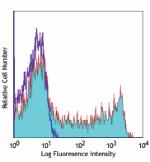
Human peripheral blood lymphocytes stained with UCHL1 APC -
FITC anti-human CD45RO
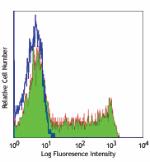
Human peripheral blood lymphocytes stained with UCHL1 FITC -
PE anti-human CD45RO
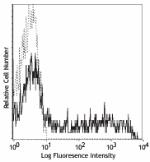
Human peripheral blood lymphocytes stained with UCHL1 PE 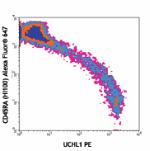
Human peripheral blood lymphocytes stained with UCHL1 PE and... 
Multiplexed IHC staining of PE anti-CD45RO (clone UCHL1) on ... -
PE/Cyanine5 anti-human CD45RO
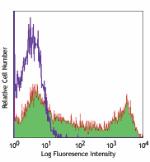
Human peripheral blood lymphocytes stained with UCHL1 PE/Cya... -
Purified anti-human CD45RO
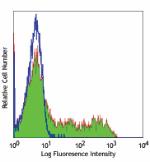
Human peripheral blood lymphocytes stained with purified UCH... 
SeqIF™ (sequential immunofluorescence) staining on COMET™ of... -
Alexa Fluor® 488 anti-human CD45RO
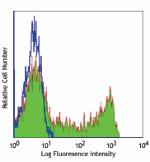
Human peripheral blood lymphocytes stained with UCHL1 Alexa ... 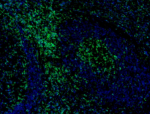
Human paraffin-embedded tonsil tissue slices were prepared w... -
Pacific Blue™ anti-human CD45RO
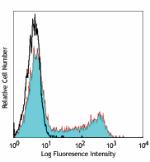
Human peripheral blood lymphocytes stained with UCHL1 Pacifi... -
Alexa Fluor® 700 anti-human CD45RO
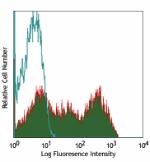
Human peripheral blood lymphocytes stained with UCHL1 Alexa ... -
Biotin anti-human CD45RO
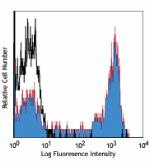
Human peripheral blood lymphocytes stained with biotinylated... -
Brilliant Violet 421™ anti-human CD45RO
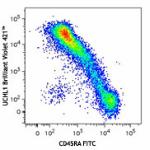
Human peripheral blood lymphocytes were stained with CD45RA ... 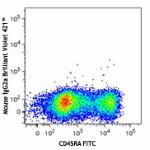
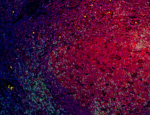
Human paraffin-embedded tonsil tissue slices were prepared w... -
PerCP/Cyanine5.5 anti-human CD45RO

Human peripheral blood lymphocytes were stained with CD45RA ... -
Brilliant Violet 570™ anti-human CD45RO
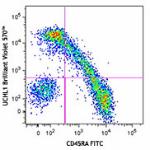
Human peripheral blood lymphocytes were stained with CD45RA ... 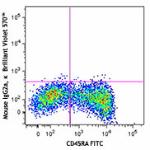
-
Brilliant Violet 605™ anti-human CD45RO
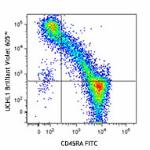
Human peripheral blood lymphocytes were stained with CD45RA ... 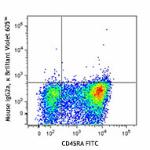
-
APC/Cyanine7 anti-human CD45RO

Human peripheral blood lymphocytes were stained with CD45RA ... -
PE/Cyanine7 anti-human CD45RO

Human peripheral blood lymphocytes were stained with CD45RA ... -
Brilliant Violet 650™ anti-human CD45RO
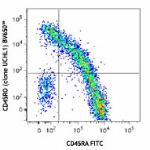
Human peripheral blood lymphocytes were stained with CD45RA ... 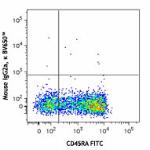
-
Brilliant Violet 711™ anti-human CD45RO
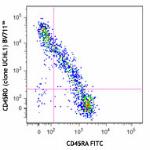
Human peripheral blood lymphocytes were stained with CD45RA ... -
Brilliant Violet 785™ anti-human CD45RO
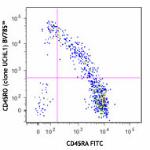
Human peripheral blood lymphocytes were stained with CD45RA ... -
Alexa Fluor® 594 anti-human CD45RO
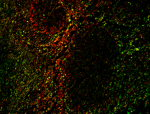
Human paraffin-embedded tonsil tissue slice was stained with... -
Purified anti-human CD45RO (Maxpar® Ready)
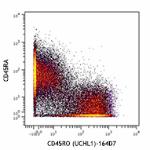
Human PBMCs stained with 153Eu-anti-CD45RA (HI100) and 164Dy... -
Brilliant Violet 510™ anti-human CD45RO
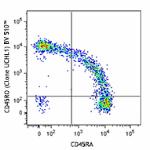
Human peripheral blood lymphocytes were stained with CD45RA ... 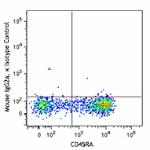
-
PE/Dazzle™ 594 anti-human CD45RO
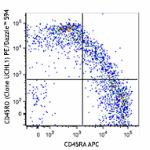
Human peripheral blood lymphocytes were stained with CD45RA ... 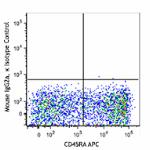
-
APC/Fire™ 750 anti-human CD45RO
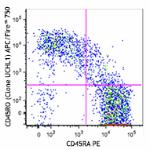
Human peripheral blood lymphocytes were stained with CD45RA ... 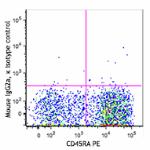
-
PerCP anti-human CD45RO
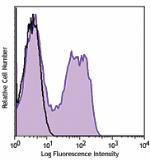
Human peripheral blood lymphocytes were stained with CD45RO ... -
APC anti-human CD45RO
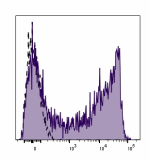
Typical results from human peripheral blood lymphocytes stai... -
TotalSeq™-A0087 anti-human CD45RO
-
TotalSeq™-B0087 anti-human CD45RO
-
TotalSeq™-C0087 anti-human CD45RO
-
Brilliant Violet 750™ anti-human CD45RO

Human peripheral blood lymphocytes were stained with CD45RA ... -
PE/Fire™ 640 anti-human CD45RO

Human peripheral blood lymphocytes were stained with CD45RA ... -
TotalSeq™-D0087 anti-human CD45RO
-
Spark Violet™ 423 anti-human CD45RO

Human peripheral blood lymphocytes were stained with anti-hu... -
GMP APC anti-human CD45RO
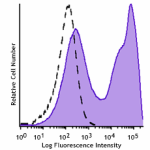
Typical results from human peripheral blood lymphocytes stai... -
PE anti-human CD45RO
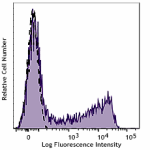
Typical results from human peripheral blood lymphocytes stai... -
TotalSeq™-Bn1369 anti-human CD45RO
-
GMP PE anti-human CD45RO
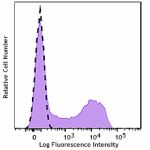
Typical results from human peripheral blood lymphocytes stai... -
Spark UV™ 387 anti-human CD45RO

Human peripheral blood cells were surface stained with anti-... -
APC/Fire™ 810 anti-human CD45RO

Human peripheral blood lymphocytes were stained with anti-hu... -
FITC anti-human CD45RO

Typical results from human peripheral blood lymphocytes stai... -
PerCP/Fire™ 806 anti-human CD45RO

Human peripheral blood lymphocytes were stained with anti-hu... -
PerCP/Fire™ 780 anti-human CD45RO Antibody

Human peripheral blood lymphocytes were stained with anti-hu...

 Login / Register
Login / Register 













Follow Us